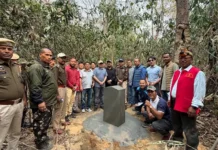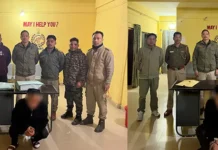NEW DELHI, 15 Dec: The Chakma Development Foundation of India (CDFI) on Friday requested the United Nations Department of Peace Keeping Operations to “prohibit Major Zobayed Mohammad, commander of the Panchari Upazilla zone; Col Abul Hasnat Jewel, commander of the Khagarachari zone; Brigadier General Mohammad Mohtashim Haider Chowdhury, commander of the Khagrachari region; and the General Officer Commanding (GOC) of the Chittagong division, Shahinul Haque, from recruitment/deployment for UN peace-keeping missions “for their involvement in the extrajudicial execution of four indigenous people leaders on the night of 11 December, 2023, at Anil Para village in Khagrachari district of the Chittagong Hill Tracts (CHT), Bangladesh.”
“These personnel served with the 203rd Infantry Battalion of the Bangladesh Army and they ought to be banned as per the UN Policy on Human Rights Screening of UN Personnel,” the CDFI said.
“At around 9:30 pm on 11 December, 2023, a group of vigilantes, wearing masks, under the escort of the Bangladesh Army personnel, raided a house at Anil Para village under Panchari police station, CHT region of Bangladesh and executed Bipul Chakma, organising secretary of the Gonotantrik Jubo Forum, Sunil Bikash Tripura, former vice president of the Pahari Chhatra Parishad, Liton Chakma, an executive member of the Gonotantrik Jubo Forum, and Rohin Bikash Tripura, a member of the United Peoples Democratic Front, a regional political organisation in the CHT, in cold blood,” it said in a release.
“The vigilantes and Bangladesh Army further kidnapped three activists, ie, Niti Dutta Chakma, Harikamal Tripura and Prakash Tripura, from the spot and they have not been found at the time of filing present communication,” it said.
“Following the extrajudicial execution, in the morning of 12 December, Officer-in-Charge (OC) of Panchari police station, Shafiul Azam, sought to visit the crime spot but was prevented from visiting by Major Zobayed Mohammad, the sub-zone commander of Panchari Upazilla. Thereafter, OC Shafiul Azam informed his seniors. At around 12 noon on 12 December, Additional Superintendent of Police of Khagrachari district, Md Jasimuddin, accompanied by his colleague ASP Abu Jafar Mohammed, reached Panchari police station for the purposes of visiting the crime scene. However, these police officials too were not allowed to visit the crime spot. At around 2:45 pm, Superintendent of Police of Khagrachari district, Mukta Dhara arrived at Panchari and held negotiations with the Bangladesh Army personnel of the Panchari sub-zone. (It was) only after the clearance was given by the senior officials of the Bangladesh Army that the dead bodies of the victims could be collected by the Bangladesh Police at 5:30 pm on 12 December – 19 hours after the murder.
“If the Bangladesh Army personnel were not involved in the extrajudicial execution of these four indigenous leaders, they would have allowed the Bangladesh Police to visit the crime spot,” said CDFI director Tejang Chakma.
“The extrajudicial execution of these four youth leaders was planned and executed by Major Zobayed Mohammad, sub-zone commander of Panchari Upazilla after approval from Col Abul Hasnat Jewel, his superior posted as the Khagarachari zone commander. Their decision was further approved by Brigadier General Mohammad Mohtashim Haider Chowdhury, commander of the Khagrachari district region and the GOC of Chittagong division, Shahinul Haque,” he said.
“As part of the policy to murder indigenous tribal leaders in the CHT region, the Bangladesh Army has been implementing a policy under which indigenous youths, often drug addicts, are recruited as vigilantes and kept in the Bangladesh Army camps. These vigilantes are taken to designated/targeted areas to kill potential indigenous/tribal leaders who are already identified by the Bangladesh Army. As these vigilantes are brought wearing masks, they are locally known as Mukhosh Bahini (masked force). Apart from killing marked indigenous leaders, the cadres of the Mukhosh Bahini are also used for extortion from the indigenous peoples only, which are shared with military officials in the area.
“Dozens of indigenous leaders, mainly belonging to the United Peoples Democratic Front, have been killed by the Mukhosh Bahini cadres, while leaders belonging to both the Jana Samhati Samiti (Santu Larma faction) and the UPDF have falsely been implicated in various criminal cases and currently on the run. This is part of the policy of the Bangladesh Army, which governs the CHTs, to destroy indigenous peoples’ leadership in the area. This policy has the approval of the Bangladesh Army at the highest level and implemented by the GOC of the Chittagong region,” the CDFI alleged.
“Though Section 17 of the 1997 Chittagong Hill Tracts Accord provided for the withdrawal of the Army camps, not a single military camp has been withdrawn and the CHTs peace accord remains in tatters,” it said.
The CDFI has also separately approached the United States to impose visa sanctions on these Bangladesh Army officials, it said.


